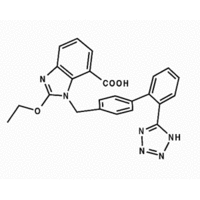Atacand
Candesartan (kan-de-SAR-tan) belongs to the class of medicines called angiotensin II receptor antagonists. It is used to treat high blood pressure (hypertension) and is marketed under the brand name Atacand® (alternative name: Ratacand®) by AstraZeneca. more...
High blood pressure adds to the workload of the heart and arteries. If it continues for a long time, the heart and arteries may not function properly. This can damage the blood vessels of the brain, heart, and kidneys, resulting in a stroke, heart failure, or kidney failure. High blood pressure may also increase the risk of heart attacks. These problems may be less likely to occur if blood pressure is controlled.
Candesartan works by blocking the action of a substance in the body that causes blood vessels to tighten. As a result, candesartan relaxes blood vessels. This lowers blood pressure.
Side-effects
By decreasing aldosterone levels, candesartan and related drugs may cause hyperkalemia (high potassium levels in the blood). Supplements containing potassium, which are sometimes taken by patients with high blood pressure, are discouraged.
Some people taking candesartan report dizziness (occurs in 1 out of every 25 persons), blurry vision, lightheadedness, a sore throat or a runny nose. More serious side effects can be fainting, decreased sexual ability, jaundice, severe nausea, fatigue and chest pain.
Contraindications
It is contraindicated in pregnancy, especially in the last six months, preexistent hyperkalemia and a history of drug reactions to other AT II inhibitors.
Read more at Wikipedia.org



